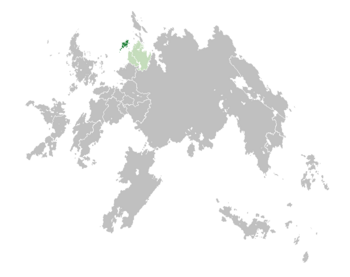Alriika
This article is incomplete because it is pending further input from participants, or it is a work-in-progress by one author. Please comment on this article's talk page to share your input, comments and questions. Note: To contribute to this article, you may need to seek help from the author(s) of this page. |
Republic of Alriika Alriika Dásseváldi | |
|---|---|
| Motto: Okta Veahka, Okta Riika One People, One Nation | |
| Anthem: Našunallávlla Alriika
| |
 Location of Alriika (dark green) – in Erdara (green & dark grey) | |
| Capital and | Sangashámman |
| Official languages | Almic |
| Recognised national languages | Almic, Lilledic language , Nausikaan |
| Ethnic groups (2015) |
|
| Demonym(s) | Alriikan |
| Government | Republic Directorial Republic |
• Director | Kirste Frosch |
• Ringet | Ringet |
| Legislature | Sáhka |
| Kola | |
| Siida | |
| Area | |
• | 15,581 km2 (6,016 sq mi) |
| Population | |
• 2019 estimate | 502,103 |
• 2015 census | 500,124 |
| GDP (PPP) | estimate |
• Total | $17,133,762,772 |
• Per capita | $34,124 |
| GDP (nominal) | 2019 estimate |
• Total | $19,084,935,030 |
• Per capita | $38,010 |
| Gini (2015) | 27.7 low |
| HDI | very high |
| Currency | Ruhta (ᚱ) |
| Time zone | +2 |
| Date format | dd-mm-yyyy |
| Driving side | right |
| Calling code | +39 |
| Internet TLD | .al |
Alriika (Almic:Alriika) officially the Republic of Alriika (Almic: Alriika Dásseváldi), is a sovereign state in northeastern Asura. Located in Alemannia, Alriika is an archipelago of islands that shares a maritime border with Kustlân to the south. With a population of just over 500,000, and an area of roughly 15,581km2, it is the least populated sovereign state in Asura, and one of the smaller states in the region as well.
Alriika is a a unitary multi-party directorial republic. It is known for the Siida, a lower house of the Sáhka, which de facto consists of every citizen of Alriika of ages 18 and above. Previously, this meant that votes took place in pre-determined polling places in the country, while deliberations for said bills took place in other public places, which were often the same building. Today, this is possible via an app and a website, though these polling places still exist in the more rural areas of Alriika. Citizens can propose legislation as well, needing merely 30,000 signatures to be added to the docket. Participation is voluntary but highly encouraged, as regular participation in government is seen as a civic duty.
The upper house is a parliamentary body called the Kola, which consists of 90 representatives, 3 from each district, voted in by multiple winner STV. Elections in this body are staggered with 6 year terms, with one third of the districts at vote every two years. The executive is led by a seven person council known as the Ringet, the proportion of members are overall proportionally determined by the composition of the Kola. While there are no regional governments, Municipalities (Almic: Gieldas) fill the role of administering various regions of the countryside, in conjunction with national authorities.
History
Prehistoric Alriika
The earliest proof of Alriikan life has been discovered in the form of glacially mummified hominids carrying spears, leading anthropologists to determine the earliest settlers lived a lifestyle of nomadic hunter gathering, following herds of reindeer to various islands in the Almic archipelago, dating back to around 10,000 BCE.
Age of Aigesarri
Ragucins and the Almic Union
The Confederation of Almic Peoples
Lhedwinic Period
Almic Revivalism
Great War
Alriikan Independence
Alriika Today
Geography
Climate
Nature
Fauna
Flora
Government and Politics
Foreign Relations and Military
Economy
Science and Technology
Energy, Infrastructure and the Environment
Demographics
Language
Religion
Ethnicity
Population by ancestry (2018)

